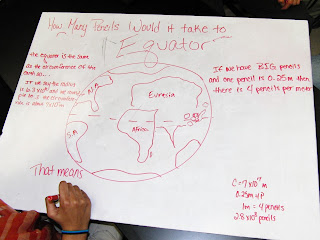So... let's do something fun! (as usual), but non-content oriented (not as usual). Let's do...
Fermi problems!
Here are the ground rules:
- No calculators, long division, or long multiplication: stick to 1 or 2 sig figs (maybe the only time I say those dreaded words all year!) and concentrate on getting the right power of ten for the answer
- No research: you know more than you think you do, and you can figure things out from distantly related facts (remember all of those chains of reasoning that we've been doing?!). Anything else? Intelligent estimation.
Here's the list of questions (many creditable to Maryland's list), along with student solutions. Many of the reasoning chains are pretty well-communicated, which is great. Some haven't gotten there yet, but we're working on it.
- How many piano tuners are there in NYC?
- How many hairs are there on your head?
- How many pencils would it take to circle the equator?
- What's "your share" of the land area of the Earth?
- How much (per hour) will you pay for classes in college?
- How many drops of water are there in the Great Lakes?
- How many blades of grass are there in a typical lawn?
- If you remove all of the string from all of the tennis rackets in the US, how far could it stretch?
- How heavy is the rain that falls on the school's roof during a big storm?
- How many hours would you have to work (at minimum wage) to pay "your share" of the national debt?
- If the whole US were a pool, how deep would it be when filled with all of the milk consumed in the US in a year?
- How many flat tires are there right now in the US?
- How long would it take you to reshelve every book in the library?
- Could we build a pipe organ in the classroom that covers the whole range of human hearing?
The next time we do Fermi problems, I'll force some engagement with some of these that just seem impossible to them (until they dig in), like the drops of water in the Great Lakes, the number of piano tuners, or (my personal favorite) the amount of water flowing through the Mississippi River in a year.










This looks like a lot of fun. Did they debate/argue with each other the various merits of the various approaches for a common problem?
ReplyDeleteTotally looks like fun. I think finding the right balance of having students work on common problems vs. problems of choice is one that is worth my further attention.
ReplyDeleteI think/hope that it was fun for them, and better than just a Sporcle day or certainly than some sort of movie or something. There was one group that totally tried to do as little as possible, but I was pleased with the general spirit and quality of work. :)
ReplyDelete@Andy: there was certainly some debate, but I think it'd be so much more useful and interesting with those harder or more abstract problems. The approach wouldn't be as clear, and they could really get at discussing competing models. Maybe that's why they didn't do them! Well, I'll say probably that's why - they're so in love with the path being laid out for them.